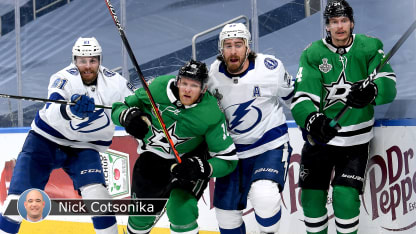The Stars traveled to Edmonton, where they've been ever since. The Lightning started out in Toronto, then moved on to Edmonton for the Eastern Conference Final and now the Stanley Cup Final.
"It's tough," Tampa Bay center Barclay Goodrow said Sunday, sporting a thick beard and a cut on the bridge of his nose. "It's been, whatever, how many number of days. But when you think back to when we first got to Toronto, that seems like six months ago.
"Like, it's been a grind. Yeah, there's definitely a lot of things that you miss. But ultimately, if we end up winning the trophy, it makes all those sacrifices worth it."
The end is coming, one way or another.
Game 6 of the Stanley Cup Final is at Rogers Place in Edmonton on Monday (8 p.m. ET; NBC, CBC, SN, TVAS). If the Lightning win, they raise the Cup. If the Stars win, they force Game 7 on Wednesday.
In normal times, we like to say the Stanley Cup is the hardest trophy to win in sports because of the tremendous physical, mental and emotional investment made in the Stanley Cup Playoffs.
These aren't normal times, of course.
RELATED: [Complete Stanley Cup Final coverage]
This championship should go down as the hardest to win in NHL history because of the added layers of adversity -- the pause March 12 due to concerns surrounding the coronavirus, the small-group workouts, the mid-summer training camp, the 24-team tournament, the isolation in the hub cities of Edmonton and Toronto, the strict safety protocols, the lack of fans in the stands.
It should go down as the hardest to lose too.
After the Boston Bruins were eliminated, forward Brad Marchand said: "It's kind of a waste of time. We spent the last three months getting ready for this, and we walk away without anything to show for it."
And that was Aug. 31, not Sept 28, let alone Sept. 30. That was after 37 days in the bubble, not 65 days, as it will be for Game 6, or 67, as it will be if we get to Game 7.
Bottom line: For the team that wins this series, all the sacrifices will seem worth it. For the team that loses, all will seem for naught.
That's what's at stake here.
You could feel it in Game 5. The Stars fell behind 2-1 when Tampa Bay defenseman Mikhail Sergachev scored at 3:38 of the third period, but forward Joe Pavelski, a 36-year-old veteran who has never won the Cup, tied it at 13:15. For the first time in history, the Stanley Cup Final had a game go to overtime for the second straight night.
Then the game went to double overtime, and forward Corey Perry, a 35-year-old veteran who hasn't won the Cup since he was a 22-year-old with the Anaheim Ducks in 2007, scored at 9:23 to give the Stars a 3-2 win and extend their stay in the bubble.
"Obviously, it's huge," Dallas defenseman Jamie Oleksiak said. "I think when you're in a situation like that, some desperation comes in, and I think experience comes in. I think those guys stepped up big for us, you know, Perry and Pavelski and guys that have played in key games like that and had their backs against the wall."

